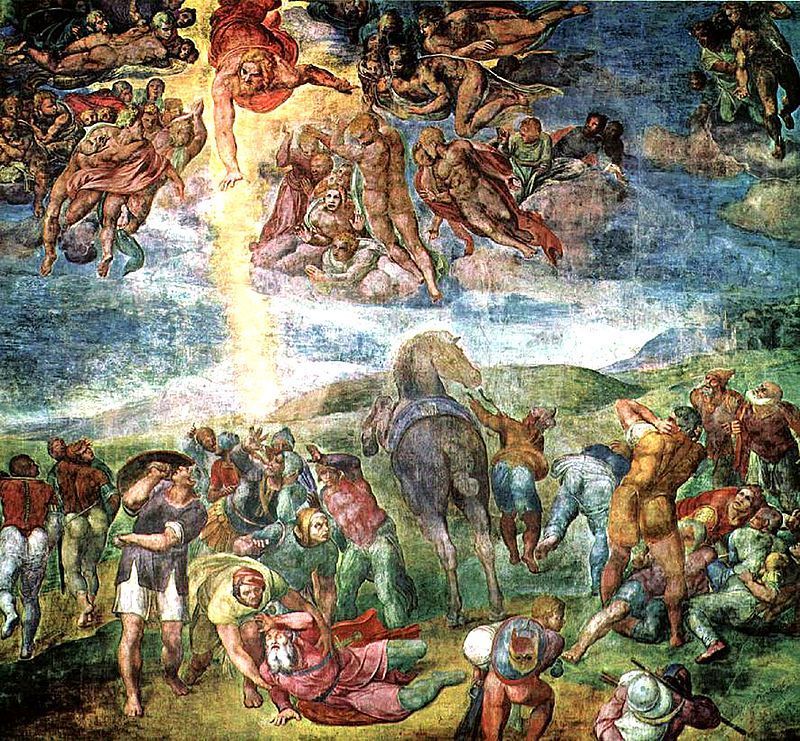Reflections on Conversion Proselytism Sales

The Conversion of Saul / Paul by Michelangelo
Guess what!!? Business is using not just the “mission” word, but now also the “conversion” word.
“…They wanted to examine the reps role throughout the sales funnel, from prospect for leads to converting those leads to customers,” reports the Harvard Business Review in its July-August 2023 edition on pages 15-18. (HBR Reprint F2304A)!
Prospecting and converting is part of a study of the auto insurance industry carried out by Srninath Gopalakrishna and colleagues of the University of Missouri. They were trying to learn what drives sales success. What they found is that prospecting is driven by motivation, opportunity, and ability and can be effectively carried out by novices. But - and this is key - “conversion” of identified prospects was more effective when carried out by experienced reps. Interesting!
Prospecting and converting obviously drives success in the sales world. As a concept converting is a well-known in religious parlance. Prospecting may be a less familiar term, but a not unfamiliar practice in some religious circles. In the sales world prospecting is identifying a potential buyer. But converting means closing the deal.
Conversion
In religious terms, conversion is transitioning from one life-shaping understanding to another. The Damascus Road conversion of St. Paul as described in Acts 9:1-22 is one of Christianity’s examples of dramatic conversion. On the road to terrorizing early Christians, Saul experiences the divine call to change. The persecutor is transformed into Paul the indefatigable missionary of Jesus' love movement.
Emperor Constantine’s is another, less attractive conversion example. Upon seeing a vision with the cross/sword and motto “in hoc signo vinces” (in this sign, you will conquer) promising victory in battle, Emperor Constantine is converted to identifying himself as a Christian.
John Wesley reported that “his heart was strangely warmed” listening to a Christian preacher and that was a tipping point in his life.
So, conversions can take place as an epiphany - moment of transformative existential awareness. A person suddenly or gradually senses that their “way of life” is no longer “their core self” and embraces another more integral way of being.
.
Proselytism
But too often such conversions happen with external influences. The word “proselytism” comes into play here. Says Wikipedia, “Proselytism is the policy of attempting to convert people's religious or political beliefs.” Historically the words had a neutral meaning but in our day it has increasingly sinister connotations: individual agency may be impaired by external influences, often pressures hard to resist.
Some of these influences may be benign and others not. They can vary dramatically. In the Middle Ages of Europe, Charlemagne used the ultimate social pressure, offering the Saxon tribal people a choice: leave your “paganism” to become Christians by being baptized, or die by the sword of my warriors. Pressures are usually less threatening than that. They can also be financial rewards, enhanced social status, family approval, lover’s appeals, etc.
In Canada it was government policy with the active support of the Christian churches to pressure Indigenous peoples to adopt Christianity as their way of life. Assimilation was the goal: turning Indigenous Peoples away from their “pagan and heathen, uncivilized ways” into “civilized, settled, Christian, citizens”. The history of this policy is full of many generational trauma, harm, and suffering by Indigenous people. The policy and its practices are worthy of confession, repenting, apologies, and intense discernment of more faithful ways by a humbler church.
The trouble with proselytism is that usually the people doing the prospecting assume that they know best. The recruiter may even understand her/his aggressive role as beneficial – “I’m trying to save this 'other' from damnation.”
Whether it is assertive individuals or aggressive faith communities, the pressure is too often very real. Superiority, hubris, social power, enticements of various types are exploited to make the conversion happen. Whether the change caused is deeply rooted, heartfelt, or life-giving is too often not factored in by the recruiter. Presumably the more “experienced [religious] salesperson – the “closer” knows the right levers to press and the subtle pressures to apply “for your own good” to get the sale, the conversion.
The Spirit Way
Adopting a recruiter’s way and truth is no blessing. The “other” becomes alienated from their true selves. Proselytism doesn’t take seriously enough the humanity of the “other”. It usurps the role of the ubiquitous Divine Spirit who “works in us and others” calling each and all to immerse ourselves in the divine presence. Conversion is intended to be the work of the Spirit - summoning out of us the gifts with which each human being is endowed so that the fruits of our living may flourish.
Christians are called not to recruit, to sell, to coerce, to "convince", but simply to be the persons Creator calls us to become. In the best of Christianity, the 'other’s' freedom, humanity, and personhood is recognized and honoured. With people of other or no particular faith, we are given opportunity for dialogue for mutual benefit. Real dialogue may result in deeper awareness of truth for both partners in the conversation.
The “great commandment” applies: “love God above all and your neighbour as yourself.” (Matthew 22:35-40) Not even the “Great Commission” (Matthew 28:19-20) gives anyone the right to treat other human being as objects for change.
The Human Way
I assume this applies not only to those who identify as friends and companions of Jesus today, but also to all sales people of whatever faith and of whatever is for sale. Making the sale is a secondary goal, after honouring the humanity of the other and seeking to respond to the real needs they identify. The human way for religion and commerce!

